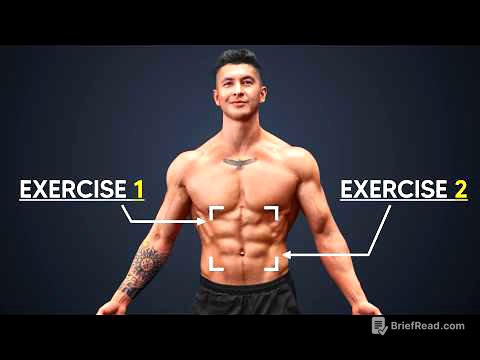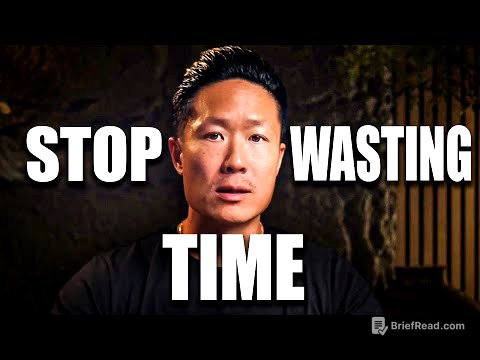Brief Summary
This video discusses how to slow down aging, prevent muscle loss, boost energy, and maintain high testosterone levels through specific lifestyle strategies. It emphasizes the importance of understanding the science behind aging, which involves mitochondrial decline, hormonal shifts, inflammation, oxidative stress, and loss of muscle mass. The video provides actionable steps to combat these factors, including building and maintaining muscle, optimizing hormone levels, using fasting and nutrition, and staying active.
- Build and maintain muscle through strength training.
- Optimize testosterone levels with proper nutrition, stress management, and sleep.
- Use intermittent fasting and quality nutrition to reduce inflammation and boost longevity.
- Incorporate daily movement and mobility exercises.
Introduction
The video introduces the concept that while aging is inevitable, the way one ages is controllable. It contrasts men who decline rapidly after 40 with those who remain strong and energetic into their later years, highlighting that understanding and combating the science of aging is key. The speaker, Dr. Seth Kapart, emphasizes that science-backed strategies can slow aging, prevent muscle loss, boost energy, and maintain testosterone levels.
Why Do We Age? The Science Behind It
Aging involves changes in cells, hormones, and metabolism. Key factors driving aging include mitochondrial decline, where cells become less efficient, leading to fatigue and slower recovery. Hormonal decline, particularly in testosterone levels, results in muscle loss, fat gain, and reduced energy. Inflammation and oxidative stress from toxins and poor diet cause chronic inflammation and increase disease risk. Loss of muscle mass (sarcopenia) leads to a slower metabolism and higher injury risk.
Step One: Build and Maintain Muscle
Building and maintaining muscle is crucial for anti-aging. After 40, individuals lose 3-5% of muscle mass per decade if they don't actively work to prevent it. Strength training at least three to four times a week, focusing on compound movements like squats, deadlifts, and pull-ups, is essential. Muscle mass is a significant predictor of a longer, healthier life, reducing disease risk and improving metabolic health and mobility. Cardio is important, but strength training should not be ignored to avoid accelerating aging.
Step Two: Optimize Your Testosterone and Hormones
Hormones, especially testosterone, play a vital role in how one feels, recovers, and ages. To maintain high testosterone levels naturally, focus on key nutrients like zinc, magnesium, boron, vitamin D, and healthy fats. Managing stress through meditation and disconnecting from screens can regulate cortisol levels, supporting healthy hormones. Prioritizing sleep, aiming for 7-9 hours of quality sleep, is crucial as testosterone is produced during sleep. If testosterone is clinically low, testosterone replacement therapy (TRT) may be considered.
Step Three: Use Fasting and Nutrition to Slow Down Aging
Diet and meal timing significantly impact aging. Intermittent fasting increases growth hormone, improves insulin sensitivity, and triggers autophagy, a process where the body cleans out damaged cells. A 16/8 fasting window (16 hours fasting, 8 hours eating) helps control blood sugar, boost metabolism, and reduce inflammation. When eating, prioritize proteins and healthy fats like steak, eggs, wild-caught fish, avocados, and olive oils to support hormone production, muscle maintenance, and brain function. Avoid processed foods, seed oils, and refined sugars, which drive inflammation and hormone imbalances.
Step Four: Move Daily and Stay Mobile
Maintaining mobility and staying pain-free is important. Incorporate daily movement outside of workouts, such as walking 8-10,000 steps per day, stretching, and staying active through sports or activities with family. Joint pain and stiffness are often results of a sedentary lifestyle, not just normal aging.
Final Thoughts
The blueprint for staying young and strong involves lifting weights to build muscle, optimizing testosterone through diet, sleep, and stress management, using fasting and quality nutrition to reduce inflammation, and moving daily through walking, stretching, and sports. Aging does not have to mean becoming weak; taking control now can lead to a strong, energetic life.









